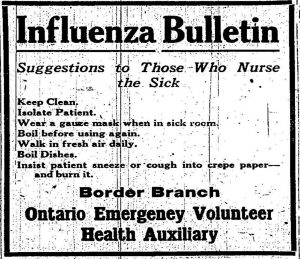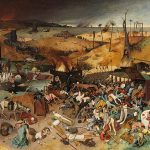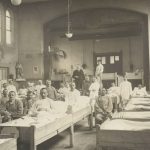Sometimes it feels as though we are living in unprecedented times.
We live in a globalised world that is rife with global problems – instability, conflict and inequalities that seem unsurpassable. And now, a pandemic that is leaving a wake of lost lives, unemployment and overstretched medical services as it runs its course around the globe.
However, the advances in technology of today’s world allow us to connect in ways that were never before possible. We can connect to one another, and we can connect to the people of the past. People who have faced, suffered, and overcome times that they must have themselves felt were unprecedented.
There is comfort and wisdom in this connection.
The power of primary sources
It was the Spanish philosopher George Santayana who wrote, “those who cannot remember the past are condemned to repeat it”. Although it has become a much repeated and paraphrased adage, an aspect of this line has been resonating with me lately.
In our modern, hyper-visual era, we are inundated with media. Speaking generally, and from my experience, stories don’t seem entirely real until we see visual evidence of them.
While at first glance, older materials can seem very foreign, abstract and unrelated to our modern life, they still have a very real power. We need these primary sources. Moreover, we need the storytelling, documentation and record-keeping that brings these sources to life.
- The Triumph of Death By Pieter Bruegel the Elder, Public Domain, https://bit.ly/2X3ZpCr
- Serbian soldiers being treated for Spanish flu, by H.A. van Oudgaarden, provided by Europeana: CC BY-SA 3.0 https://bit.ly/2UThz7f
A connection to the past can help us understand both our vulnerability and capacity for resilience. It can help us learn from past lessons, appreciate the scientific and technological advances we have now, and grow a sense of solidarity with humanity at large.
There’s comfort in knowing that humanity has overcome similar challenges in the past. There are also lessons that should not be forgotten.
Lessons from the past
Although most of us try, we can never be truly prepared for what is coming next. A few months ago, it would be hard to believe the changes our societies and governments are making in response to the COVID-19 pandemic.
However, we can look to the past to make predictions for the future.
Crisis has often been the catalyst for change. For example, the flu epidemic that ravaged most of the world in 1918 also set the stage for the creation of national health services in Europe and beyond.
Unfortunately, crisis can also unleash an uglier side of humanity. The Black Death, which decimated populations in the 14th century, led to rampant violence and retribution, targeting Jewish and other vulnerable populations. With the perspective of our modern understanding of pathogens, we can look at the suffering caused by lack of knowledge as a lesson that is not to be repeated.
Xenophobia is a long-standing result of global crises. UNESCO has drawn on the example of the Black Death as a warning against knee-jerk reactions that would seek to restrict connection in the future:
It may be tempting in uncertain times, particularly now as the world is witnessing the rapid spread of COVID-19, to conclude that the only way to prevent challenges such as the spread of infectious diseases is to restrict movement and exchange, and somehow roll back globalization and the connectedness of different cultures and peoples. However, the spread of plague in a world without planes, trains and cruise ships, serves as a reminder that diseases can move rapidly even without such technologies.
We can access the past to inform better decision-making now, and into the future. Professionals from the information service, archive, preservation and conservation and cataloging fields are necessary to help discover, preserve and interpret the primary source evidence of these lessons.
Heritage for hope and understanding
In the face of the many pressing challenges COVID-19 has brought, there has also been a noticeable appreciation and need for culture – for connection, entertainment, inspiration and hope.
Cultural heritage – especially the documents, photographs, archival materials and stories of people facing past pandemics, can now resonate more than ever with audiences – possibly even audiences that would not have readily engaged before.
We could approach this as an opportunity to engage with our communities – connecting them to one another and to the past through the heritage we protect and share.
Cultural heritage can give a historical perspective. Pestilence and war have long opened the door for medical advances. Even knowledge as seemingly simple and obvious as proper hygiene and hand washing was learned through hard lessons.

“Ontario Emergency Volunteer Health Auxiliary (Border Branch). ‘Influenza Bulletin” by ArchivesOfOntario, CC PDM 1.0 https://bit.ly/2xDMrAY
Could sharing these stories help people today understand how important it is to take public health advice concerning sanitation and hygiene seriously? Could it help put our vulnerability into context and therefore add weight to public health initiatives?
A quick online search of “past pandemics” will lead to many pages of blog articles, news reports, and human-interest pieces published in the past weeks, all drawing on a seemingly increased interest for stories from historic disease response.
A great example can be found at the Centre for Disease Control (CDC) in the United States. The site maintains an online archive of photographs, public health posters, articles and stories from the 1918 Flu epidemic and other 20th century public health emergencies. They have been sharing these images on social media with the tag #CDCHistory, with considerable engagement.
In response to COVID-19, there is clearly interest for historical context among the general population, and therefore a need to provide accurate, unbiased information.
Can this be an opportunity for engagement?
Libraries hold collections that can help society access the educational, social, scientific and artistic values of documentary heritage, and connect to the past during this time when so many of us are longing for connection.
Do you have examples to share? Let us know!


Pingback: Special Collections and the COVID-19 Return to Campus – ACRLog
Pingback: [Storytelling, Livros Raros] Contar histórias em tempos difíceis: acessar o passado durante uma pandemia – CRB-8
Muy interesante el artículo en estos tiempos en que nos estamos, o estábamos, olvidándonos del pasado.